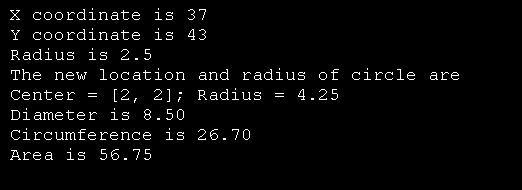Define Overridable Member Function

Imports System
Public Class MainClass
Shared Sub Main(ByVal args As String())
Dim circle As Circle
circle = New Circle(37, 43, 2.5) ' instantiate Circle
Console.WriteLine( "X coordinate is " & circle.X & vbCrLf & _
"Y coordinate is " & circle.Y & vbCrLf & "Radius is " & _
circle.Radius )
circle.X = 2
circle.Y = 2
circle.Radius = 4.25
Console.WriteLine("The new location and radius of circle are " & _
vbCrLf & circle.ToString() )
Console.WriteLine( "Diameter is " & _
String.Format("{0:F}", circle.Diameter()) )
Console.WriteLine("Circumference is " & _
String.Format("{0:F}", circle.Circumference()) )
Console.WriteLine( "Area is " & String.Format("{0:F}", circle.Area()) )
End Sub
End Class
Public Class Circle
Inherits Point ' Circle Inherits from class Point
Private mRadius As Double
' default constructor
Public Sub New()
' implicit call to Point constructor occurs here
Radius = 0
End Sub ' New
' constructor
Public Sub New(ByVal xValue As Integer, _
ByVal yValue As Integer, ByVal radiusValue As Double)
' use MyBase reference to Point constructor explicitly
MyBase.New(xValue, yValue)
Radius = radiusValue
End Sub ' New
' property Radius
Public Property Radius() As Double
Get
Return mRadius
End Get
Set(ByVal radiusValue As Double)
If radiusValue > 0 Then
mRadius = radiusValue
End If
End Set
End Property ' Radius
' calculate Circle diameter
Public Function Diameter() As Double
Return mRadius * 2
End Function ' Diameter
' calculate Circle circumference
Public Function Circumference() As Double
Return Math.PI * Diameter()
End Function ' Circumference
' calculate Circle area
Public Overridable Function Area() As Double
Return Math.PI * mRadius ^ 2
End Function ' Area
' return String representation of Circle
Public Overrides Function ToString() As String
' use MyBase reference to return Point String representation
Return "Center = " & MyBase.ToString() & _
"; Radius = " & mRadius
End Function ' ToString
End Class
Public Class Point
' implicitly Inherits Object
' point coordinate
Private mX, mY As Integer
' default constructor
Public Sub New()
' implicit call to Object constructor occurs here
X = 0
Y = 0
End Sub ' New
' constructor
Public Sub New(ByVal xValue As Integer, _
ByVal yValue As Integer)
' implicit call to Object constructor occurs here
X = xValue
Y = yValue
End Sub ' New
' property X
Public Property X() As Integer
Get
Return mX
End Get
Set(ByVal value As Integer)
mX = value
End Set
End Property ' X
' property Y
Public Property Y() As Integer
Get
Return mY
End Get
Set(ByVal value As Integer)
mY = value
End Set
End Property ' Y
' return String representation of Point
Public Overrides Function ToString() As String
Return "[" & mX & ", " & mY & "]"
End Function ' ToString
End Class
Related examples in the same category